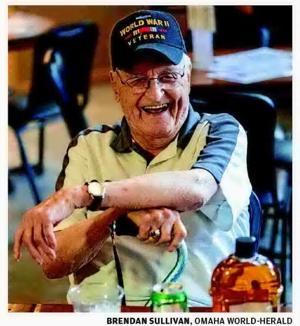Ed Morrissette squinted through misty morning fog at the French coastline toward a beach code-named Omaha. The 20-year-old soldier with the storied 1st Infantry Division had endured a rough ride across the English Channel in a wind-whipped ship. Now, as June 6, 1944, dawned — D-Day — a sailor released the front door of his landing craft.
Morrissette and another soldier dropped side-by-side into the neck deep surf. Along with their rifles, together they held aloft a large roll of communications wire. But the wire roll made a fat target for well-placed German machine-gun fire, which spattered in the water all around them.

They quickly dropped it and made for the beach. Morrissette waded past the bodies of dead Americans, floating in the waves. "I could not take the time to stop and ponder what was happening," he wrote years later in an account of his wartime service.
"My main goal was to get up on that beach in one piece and join up with my company." Morrissette, of Papillion, survived D-Day, and 11 more months of combat before World War II ended in Europe. He lived another eight decades before his death June 24, and less than a month after the 80th anniversary of D-Day.
He was 100. Guillaume Lacroix, the French consul general in Chicago, praised Morrissette as a "true hero" in 2019 in presenting him with the French Legion of Honor, the nation's highest military and civilian award, at a cemetery in the Elkhorn area. "The debt we owe you, the 'Greatest Generation,' is a debt we will never be able to repay," Lacroix said.
"For all your actions, I want to say, 'Thank you.'" Edward Morrissette was born July 27, 1923, and endured what he called "tumultuous" years during his childhood in Depression-era North Carolina. "I had come from a broken home, my family was scattered, my mother and father divorced," Morrissette wrote.
He lived with an aunt and dropped out of high school to work. In 1940, expecting to be drafted, he visited an Army recruiter. He lied about his age because he wasn't yet 18.
Morrissette chose an assignment with the 16th Infantry Regiment of the 1st Infantry Division, headquartered in New York City. "I was enamored with the idea of going to the 'big city' to see those tall buildings, and all those people," Morrissette wrote. The unit moved to Fort Devens, Massachusetts, in early 1941.
He was hospitalized there for 42 days after a piece of steel wool embedded in his finger and became infected — the most serious wound he received despite spending three years in combat zones. The division's training ramped up after the Dec. 7, 1941, attack on Pearl Harbor.
The following summer, his unit deployed to Great Britain aboard the luxury liner Queen Mary, zig-zagging across the ocean to avoid German U-boats. In November 1942, his regiment participated in Operation Torch, the invasion of North Africa. Morrissette's unit stormed ashore near Oran, Algeria, overcoming light resistance from Vichy French troops.
During the campaign, he earned a Bronze Star for shooting down a German fighter plane. Get local news delivered to your inbox!.



















